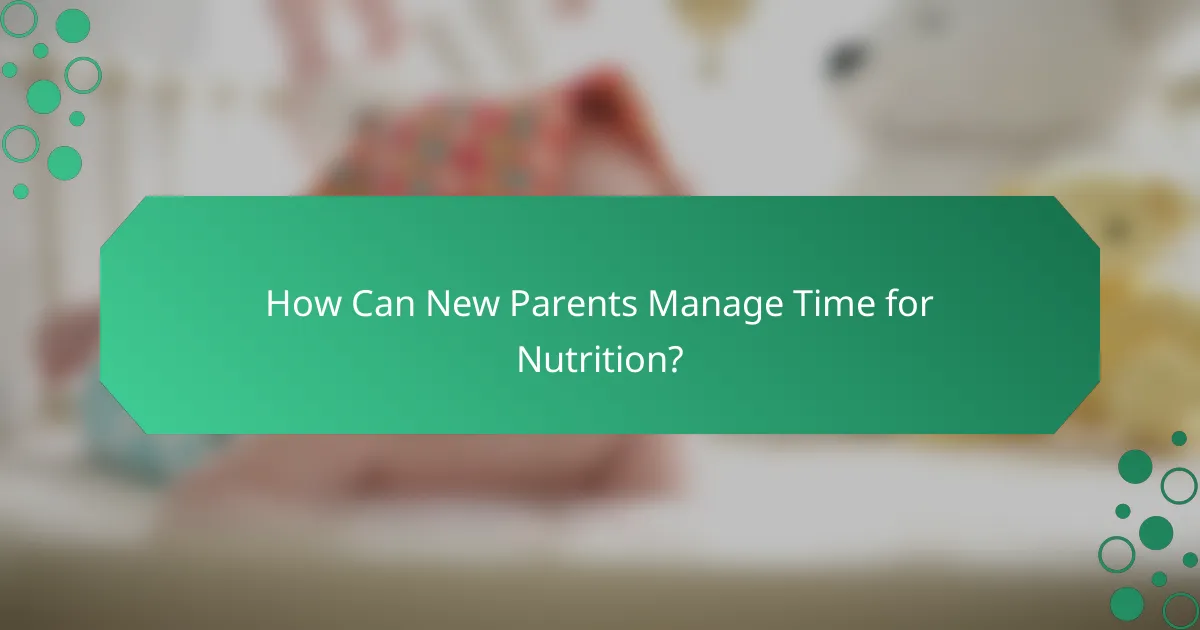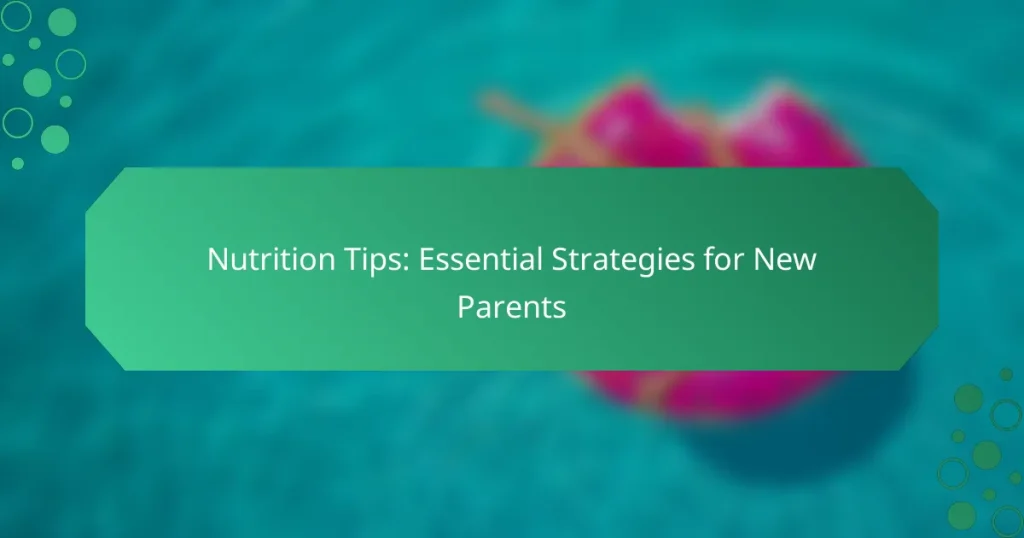Navigating the early days of parenthood can be overwhelming, making proper nutrition essential for new parents. By focusing on a balanced diet, staying hydrated, and planning meals effectively, parents can ensure they have the energy and nutrients needed to care for themselves and their newborns. Establishing routines and prioritizing meal preparation can make healthy eating more manageable during this demanding time.

What Are the Best Nutrition Tips for New Parents?
The best nutrition tips for new parents focus on maintaining a balanced diet, staying hydrated, and planning meals effectively. These strategies help ensure that both parents and their newborns receive the essential nutrients needed for health and energy during this demanding time.
Focus on balanced meals
Balanced meals should include a variety of food groups: proteins, whole grains, healthy fats, fruits, and vegetables. Aim for meals that incorporate lean meats, legumes, whole grains like brown rice or quinoa, and plenty of colorful vegetables. This diversity ensures a broad spectrum of nutrients essential for recovery and energy.
Consider using the plate method: fill half your plate with fruits and vegetables, a quarter with lean protein, and a quarter with whole grains. This visual guide can simplify meal preparation and help maintain balance in your diet.
Incorporate nutrient-dense snacks
Nutrient-dense snacks are crucial for new parents who may not have time for full meals. Opt for snacks that provide energy and essential vitamins, such as nuts, yogurt, or fruit smoothies. These options can help sustain energy levels throughout the day.
Keep healthy snacks readily available. For example, prepare snack packs with cut vegetables, hummus, or cheese sticks to grab on the go. This approach minimizes the temptation to reach for less nutritious options when hunger strikes.
Stay hydrated
Staying hydrated is vital for overall health, especially for new parents. Aim for at least 2 to 3 liters of water daily, adjusting based on activity levels and climate. Proper hydration supports energy levels and can improve mood and cognitive function.
To make hydration easier, carry a reusable water bottle and set reminders to drink water throughout the day. Herbal teas or infused water with fruits can also add variety and flavor to your hydration routine.
Plan meals ahead
Meal planning can save time and ensure healthy eating. Dedicate a day each week to prepare meals in advance, focusing on simple recipes that can be easily reheated. Consider batch cooking soups, stews, or casseroles that can last several days.
Utilize a meal calendar to organize what to cook each day. This strategy reduces the stress of daily decision-making and helps avoid last-minute unhealthy choices.
Consider meal delivery services
Meal delivery services can be a convenient option for new parents who struggle with time constraints. These services often provide balanced, pre-portioned meals that cater to various dietary preferences, making it easier to maintain healthy eating habits.
When selecting a meal delivery service, look for options that emphasize fresh ingredients and nutritional balance. Many services allow customization based on dietary needs, which can be particularly beneficial during the postpartum period.

How Can New Parents Manage Time for Nutrition?
New parents can manage time for nutrition by establishing routines and utilizing efficient meal strategies. Prioritizing meal planning and preparation helps ensure that healthy options are readily available, even amidst the demands of caring for a newborn.
Set a meal schedule
Creating a meal schedule helps new parents allocate specific times for eating, which can prevent skipping meals. Aim for three balanced meals a day, supplemented by healthy snacks, to maintain energy levels.
Consider setting reminders on your phone or using a family calendar to keep everyone on track. Consistency in meal times can also help establish a routine for your baby, making it easier to coordinate feeding times.
Prep meals in advance
Meal prepping can save significant time during busy weeks. Set aside a few hours once a week to cook and portion meals that can be easily reheated, such as casseroles, soups, or grain bowls.
Focus on meals that store well in the fridge or freezer, and consider using clear containers for easy identification. Labeling each container with the date can help ensure you use older meals first, minimizing waste.
Involve family members
Engaging family members in meal preparation can lighten the load for new parents. Encourage partners or older children to help with cooking, grocery shopping, or even setting the table.
Consider creating a rotating schedule where each family member takes turns preparing meals. This not only fosters teamwork but also allows everyone to contribute to the family’s nutrition in a meaningful way.

What Nutrients Are Essential for New Parents?
New parents need a balanced intake of nutrients to support their energy levels and overall health during this demanding time. Key nutrients include proteins, healthy fats, fiber, vitamins, and minerals, which together help in recovery and maintaining well-being.
Prioritize protein intake
Protein is crucial for muscle repair and energy, especially for new parents who may experience fatigue. Aim for a daily intake of around 60-100 grams, depending on individual needs and activity levels. Good sources include lean meats, eggs, dairy, legumes, and nuts.
Incorporating protein into meals can be simple; consider adding Greek yogurt to smoothies, including beans in salads, or snacking on nuts. This not only boosts protein intake but also helps keep you full longer.
Include healthy fats
Healthy fats support brain function and hormone production, which are vital during the postpartum period. Focus on sources like avocados, olive oil, nuts, and fatty fish such as salmon. Aim for about 20-35% of your daily calories to come from healthy fats.
To easily incorporate healthy fats, try drizzling olive oil on vegetables, adding avocado to sandwiches, or enjoying a handful of nuts as a snack. These choices can enhance meals while providing essential fatty acids.
Ensure adequate fiber
Fiber is important for digestive health and can help prevent constipation, a common issue for new parents. Aim for a daily intake of about 25-30 grams from whole grains, fruits, vegetables, and legumes. This can improve gut health and promote a feeling of fullness.
To boost fiber intake, include whole grain bread, oatmeal, and plenty of fruits and vegetables in your diet. A simple strategy is to fill half your plate with veggies at each meal, ensuring you meet your fiber goals.
Focus on vitamins and minerals
Vitamins and minerals play a significant role in recovery and overall health. Key nutrients include calcium, iron, vitamin D, and folate. Incorporate a variety of colorful fruits and vegetables, dairy products, and whole grains to cover these needs.
Consider a daily multivitamin if dietary intake is insufficient, but consult with a healthcare provider first. Regularly consuming fortified foods, such as cereals and dairy alternatives, can also help meet vitamin and mineral requirements effectively.

How Can New Parents Handle Cravings?
New parents can manage cravings by making conscious food choices and understanding their emotional triggers. By opting for healthier alternatives and practicing mindful eating, they can satisfy their cravings without compromising their nutrition.
Opt for healthy alternatives
Choosing healthier options can help new parents enjoy their favorite flavors without the guilt. Instead of reaching for sugary snacks, consider fruits, nuts, or yogurt as satisfying substitutes. For example, if craving chips, try air-popped popcorn or vegetable sticks with hummus.
Stocking the pantry with nutritious snacks can make it easier to resist unhealthy temptations. Keep items like whole-grain crackers, dark chocolate, or homemade energy bars readily available to curb cravings effectively.
Practice mindful eating
Mindful eating involves paying attention to hunger cues and savoring each bite. New parents should take time to eat slowly and enjoy their meals, which can help prevent overeating. Setting aside distractions, such as phones or TVs, during meals can enhance this practice.
Additionally, keeping a food journal can help track what you eat and how it makes you feel. This awareness can lead to better choices and a deeper understanding of cravings.
Stay aware of emotional triggers
Emotional triggers can significantly influence cravings, especially for new parents facing stress or fatigue. Identifying these triggers is crucial for managing cravings effectively. For instance, if stress leads to a desire for comfort food, finding alternative coping strategies like exercise or relaxation techniques can be beneficial.
Creating a support system with friends or family can also help manage emotional eating. Sharing experiences and feelings can reduce the urge to turn to food for comfort, promoting healthier habits overall.

What Are Common Dietary Mistakes for New Parents?
New parents often face dietary mistakes that can affect their health and energy levels. Common pitfalls include skipping meals, relying heavily on convenience foods, and neglecting self-care, which can lead to fatigue and nutritional deficiencies.
Skipping meals
Skipping meals is a frequent mistake among new parents, often due to time constraints or overwhelming responsibilities. This can lead to decreased energy levels and poor concentration, making it harder to care for a newborn.
To avoid this, try to plan meals ahead of time or keep healthy snacks on hand, such as nuts or yogurt. Aim for three balanced meals a day, supplemented by nutritious snacks to maintain energy throughout the day.
Over-reliance on convenience foods
New parents may turn to convenience foods for quick meals, which are often high in sugars, unhealthy fats, and sodium. While these options save time, they can lead to poor nutrition and weight gain.
Instead, consider batch cooking on weekends or using a slow cooker for easy meal prep. Focus on whole foods like fruits, vegetables, whole grains, and lean proteins, which can be prepared quickly and provide essential nutrients.
Neglecting self-care
Neglecting self-care is a common issue for new parents, who may prioritize their baby’s needs over their own. This can lead to stress, burnout, and unhealthy eating habits.
Make self-care a priority by setting aside time for physical activity, relaxation, and proper nutrition. Even short walks or quick workouts can boost mood and energy levels. Remember, taking care of yourself is crucial for being able to care for your child effectively.


